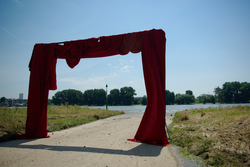
Lieder, zu singen wenn die Welt untergeht
In the organizer's words:
Songs to sing when the world ends
The Social Group
A riotous and powerful song recital
recommended for ages 14 and up
What can we do when hope becomes scarce, certainties fade, society disintegrates and community is called into question? The Soziale Gruppe searches for answers together with the audience and celebrates the revolutionary power of peaceful communication - music. The Soziale Gruppe sees singing together as a support in our crisis-ridden reality. Where people sing, we settle down, but even bad people have songs. And there is no room for quiet nuances or doubts in a loudly performed protest song. It is not the volume of many voices, but the collective ability to modulate and change that creates hope. We want to make use of this ability and sing about feelings such as fear, powerlessness and despair in order to let go of them, to be strengthened in the here and now and to be able to look to the future with more strength.
"Die Soziale Gruppe" was founded in 2016 by Anne Munka and Jan F. Kurth, with Fiona Combosch joining in 2020. The group works with the two acoustic phenomena that people have always used for communication and exchange: Language and music. After the first program in 2016, Anne Munka wrote the radio play Onomatonien for the group in 2019, which was produced by SWR and performed by the group several times. In 2022, Anne Munka conceived the participatory lecture performance "KLANGKOMUNIK - Woher kommt der Gesang?". The group wrote the music together and performed KLANGKOMUNIK at various venues - from university lecture halls to provincial theaters.
In "Lieder, zu singen wenn die Welt untergeht", the audience initially finds itself in a bourgeois song recital, which increasingly becomes a musical intervention.
This project is made possible by project funding from the Landesverband Freie Tanz und Theaterschaffende Baden-Württemberg (LaFT BW) e.V., the Kulturstiftung des Freistaates Sachsen (KdFS) and the Musikfonds e.V. from funds provided by the Federal Government Commissioner for Culture and the Media on the basis of a decision by the German Bundestag. LaFT BW e.V. is funded by the Baden-Württemberg Ministry of Science, Research and the Arts. This measure is co-financed by tax funds on the basis of the budget adopted by the Saxon State Parliament.
Location
Location | Theater


















Gemeinsam Events erleben
Events werden noch schöner wenn wir sie teilen! Deshalb kannst du dich jetzt mit Friends und anderen Usern vernetzen um Events gemeinsam zu besuchen. Loslegen